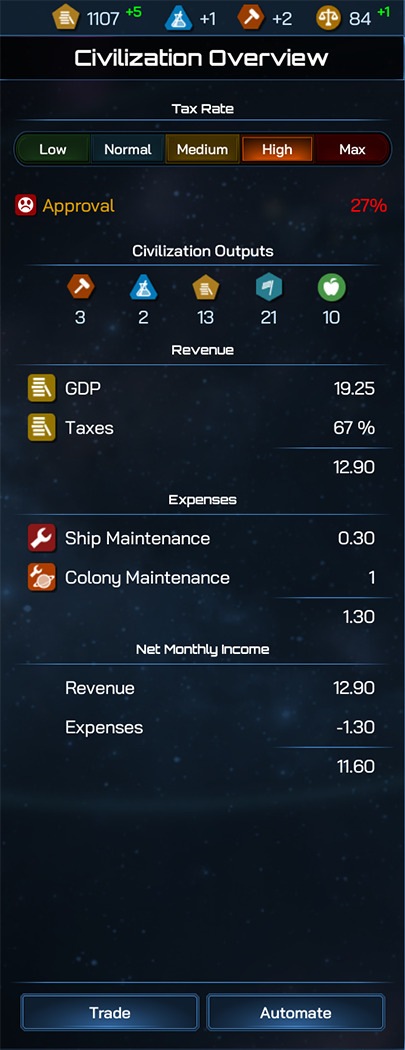Approval GC4: Difference between revisions
Kerri405848 (talk | contribs) No edit summary |
Kerri405848 (talk | contribs) No edit summary |
||
| Line 19: | Line 19: | ||
If your Civilization is suffering from low Approval, one option is to reduce Taxes, at the expense of a drop in Revenue from a reduced GDP. | If your Civilization is suffering from low Approval, one option is to reduce Taxes, at the expense of a drop in Revenue from a reduced GDP. | ||
Citizens with a high Expectations score be troublesome, and it is often a good idea to send these as Colonists to worlds that are intended to stay as Colonies, where their naturally lower Approval score will be less damaging to your economic output overall. | Citizens with a high Expectations score can be troublesome, and it is often a good idea to send these as Colonists to worlds that are intended to stay as Colonies, where their naturally lower Approval score will be less damaging to your economic output overall. | ||
Latest revision as of 16:48, 12 January 2024
Approval

Approval represents how content the Citizens in a Civilization are with their lot in life, their general happiness and loyalty towards their leader, and has a direct effect on your Civilization's overall production output.
Each Citizen has its own Approval score, which can be modified by many different factors such as their own high expectations, current Tax Rate, excessive Pollution on their world, the loyalty of their Governor, various Techs and Ideological Traits, Civilization Policies and many more.
A Core World's overall Approval is calculated as an average of all its Citizen's Approval scores.
Approval is extremely important for a Civilization's economy. A Core World's Approval score is applied as a percentage multiplier to its Planetary Output scores for Manufacturing and Research.
For example, if the Core World has a total Manufacturing Output score of 100, but the Approval rate is only 50%, then that results in a *0.50 multiplier which will halve the Manufacturing Output score to just 50. A high Approval rate of 97% would result in a *0.97 multiplier, resulting in a final score of 97, much closer to the Planet's maximum potential Manufacturing of 100.
It is clear to see that keeping your Civilization's Approval up is critical to maintaining a healthy economy and research program.

While Approval does not directly affect a Core World's Income, it is directly affected by the Civilization's Tax Rate: Normal (25% tax) will give no Approval bonus or penalty, but decreasing or increasing it will improve and reduce it accordingly, as your Citizens rejoice as their tax burden is lifted, or resent what they see as excessive and unfair tax rates. High and Max tax rates come with very steep Approval penalties, but can sometimes be safely maintained if Approval is kept very high in other aspects of the game.
If your Civilization is suffering from low Approval, one option is to reduce Taxes, at the expense of a drop in Revenue from a reduced GDP.
Citizens with a high Expectations score can be troublesome, and it is often a good idea to send these as Colonists to worlds that are intended to stay as Colonies, where their naturally lower Approval score will be less damaging to your economic output overall.